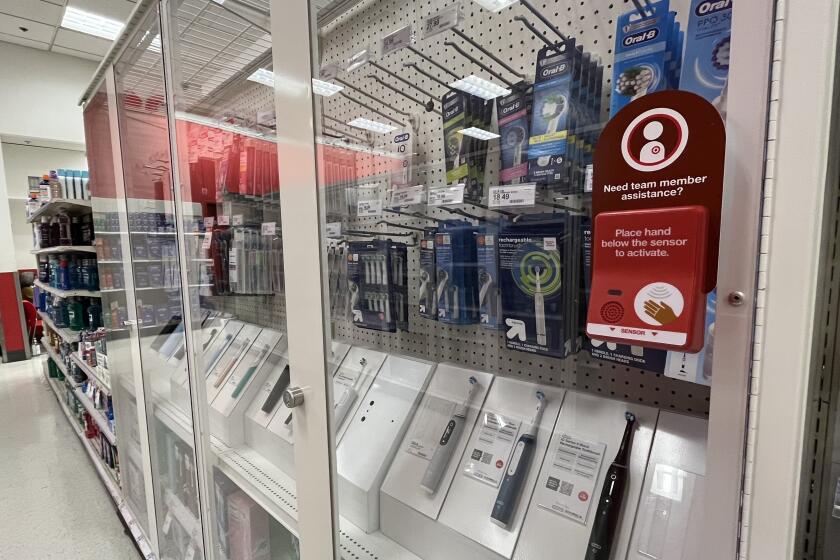Signatures roll in for tough-on-crime ballot measure to reform California’s Proposition 47

SACRAMENTO — A coalition backing a tough-on-crime statewide ballot initiative to toughen penalties for retail theft and some drug offenses on Thursday submitted more than 900,000 voter signatures backing the measure, a strong indicator that it may come before California voters in November.
The ballot initiative, called the Homelessness, Drug Addiction and Theft Reduction Act, seeks to change Proposition 47, which voters passed in 2014. It would toughen penalties for retail theft and require drug treatment for those charged with simple drug possession. It was largely funded by corporate retailers including Target and Home Depot.
The Californians for Safer Communities Coalition, the proponent of the ballot initiative, raised close to $8 million for the campaign . The secretary of state requires at least 546,651 signatures be collected by April 23 to qualify for the November ballot. County elections officials will now start the process of verifying the petition signatures to ensure they were provided by registered California voters.
The coalition in a statement said that California can no longer afford “half-measures” when it comes to addressing rampant retail theft or the growing epidemic of fentanyl overdoses.
Meanwhile, supporters of an initiative to repeal parts of Proposition 47 say they will soon submit enough signatures to qualify their measure for the November ballot.
Political strategist Gale Kaufman, who is not affiliated with the ballot measure, said that collecting well over the required amount is more of a strategy rather than being indicative of widespread support.
“You probably need [to collect] somewhere in the 750,000 or 800,000 range to make sure you’re good,” said Kaufman.
Paul Mitchell, the Vice President of Political Data Inc., said that the ability to collect such a large number of signatures in a state as vast as California “is a sign of having the money to pay for the signature gathering,” he added. “It’s not a sign of voter support.”
The proposed ballot measure comes in an election year in which crime and homelessness is expected to be a top issue, both nationally and in state and local races, and could increase voter turnout among Californians concerned about public safety.
The initiative, which seeks to reform housing, drugs, and theft all in one, touches on some of the top issues Californian voters said they care most about this year.
Voters rejected an effort to alter Proposition 47 in 2020 which would have enacted tougher criminal sentences and reduced the number of inmates eligible for parole. Kaufman cautioned that voters tend to forget what they voted on and it doesn’t necessarily foreshadow the outcome of the new measure.
Proponents of the reform, like Derreck Johnson, owner of Home of Chicken and Waffles in Oakland, echoed concerns at a news conference Thursday about the uptick in crimes in his area and the fears of businesses closing as a result.
Johnson said sales have dropped by 30 percent since March 2023, when he observed frequent “bipping” — a term for auto burglaries — in his neighborhood.
“Our customers are mostly tourists and leave their luggage in the car,” he told the Times. “The leadership in Oakland needs to start doing their job. Our job is just to put chicken and waffles on your plate.”
Cathy Adams, president of the Oakland African American Chamber of Commerce, who also supports the initiative, told The Times she has noticed more arrests since Gov. Gavin Newsom deployed 120 California Highway Patrol officers three months ago.
“I am noticing little changes, but it’s not major,” she said. “We don’t believe in mass incarceration, but at the end of the day we need something to be done.”
Assembly Speaker Robert Rivas (D-Hollister) has introduced a bipartisan legislative package to address these crimes and protect businesses to avoid bringing the issue to the ballot. If the crime initiative qualifies for the ballot, proponents and state lawmakers could potentially attempt to negotiate a legislative compromise and forestall a costly proposition campaign.
Michael Wagaman, a Democratic consultant who has worked on ballot qualification for two decades, said that voters will weigh in on many issues this election with the number of ballot measures rolling in. Usually, he said, a bombardment of measures leads voters to turn sour on propositions presented to them.
“Right now,” he said. “November is looking like it is a very busy ballot.”












